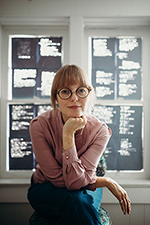Only 4 weeks until deadline!
interviews with 2021's Long Poem Prize winners
Conor Kerr
 Malahat Review poetry and fiction board member Délani Valin talks with the Long Poem Prize co-winner. Read his winning poem, "Just Passing Through," in our upcoming summer issue #215. Malahat Review poetry and fiction board member Délani Valin talks with the Long Poem Prize co-winner. Read his winning poem, "Just Passing Through," in our upcoming summer issue #215.
DV: Of your winning poem, the judges have said that it is “divided into road trips criss-crossing the western provinces” and that “the poem in its very structure stitches us into Métis history.” Many of the sections are named after passages such as “Vancouver to Edmonton” or refer to specific highways. At the same time, the poem feels very grounded in the land, with references to trapping and picking berries. There’s a sense of movement with these road trips, and when still, the speaker talks of “the need for constant mobility.” Could you speak about these tensions, and how they came to be articulated in the poem?
CK: I’ve only ever existed in a constant state of motion, mobility, movement. I love driving. I have no problem hammering out a twelve or fourteen hour drive. Even my leisurely activities of bird hunting and golfing involve walking large distances. I don’t like sitting still and I think that’s a trait that’s been passed down through generations of badass Metis and Cree ancestors. My grandparents would drive eight hours for a party and then back the next day. I know Elders right now who will drive twelve hours for a ceremony or visiting and then come back shortly after. My friends get mad at me because I describe everything as being four hours away. Kamloops? Four hours. Moose Jaw? Four hours. Saskatoon? Four hours. Lethbridge? Four hours. (Note none of these are four hours away from Edmonton.)
But at the same time everything is based around our relationships with landscapes and kinscapes. Just as that constant mobility defines us so do the areas that hold generations of blood, tears, sweat, laughs, loves, and everything that captures the human experience.
Read the rest of Conor Kerr's interview.
Jennifer Still
 Malahat Review past poetry and fiction board intern Michelle Ha talks with the Long Poem Prize co-winner. Read her winning poem, "Legs," in our upcoming summer issue #215. Malahat Review past poetry and fiction board intern Michelle Ha talks with the Long Poem Prize co-winner. Read her winning poem, "Legs," in our upcoming summer issue #215.
MH: I'm very interested in the inspiration behind "Legs," and the themes it explores. What were some influences or inspirations that led you to write this piece? Were there any considerable struggles that you faced while writing it?
JS: All my work in the last six years processes the loss of my mother. “Legs” feels almost like a table of contents of what I’ve written over hundreds of pages. As though each line holds the force of all that grief behind it. All that nonlinear story. I can feel the tension of my entire manuscript in “Legs” and this gives me hope. That I might have come full circle. That I’m orbiting something.
All my work cheers for the mothers. I’m thinking of the maternal body as home. How we circle, pull from, measure ourselves against the mother. Her textures and tones, internal and external, cellular and atmospheric, a layer of self that we are always trying to get at, arrive to, separate from. When she is gone, what is our gravity? How do we negotiate her absence? Is it in fact an absence or has something new moved in?
Possibly I’m talking about a confusion between self and mother too. We want to be our mothers and anything but them. More than them. We are drawn to and repulsed by them. How we think of our mothers may be an indication of how we think of ourselves. Do the stories we tell about our mothers reflect the possibilities we imagine for ourselves? Can we grow beyond our mothers? Do we want to?
Read the rest of Jennifer Still's interview.
|
|
|
|
|
|
|
|